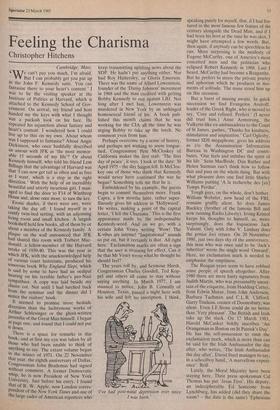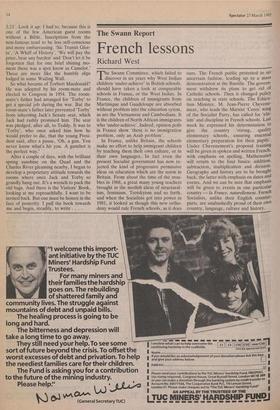Feeling the Charisma
Christopher Hitchens
Cambridge, Mass.
We can't pay you much, I'm afraid. But I can probably get you put up in the John F. Kennedy suite. You can fantasise there to your heart's content.' I was to be the visiting speaker at the Institute of Politics at Harvard, which is attached to the Kennedy School of Gov- ernment. On arrival, my friend and host handed me the keys with what I thought was a puckish look on his face. He repeated his injunction about fantasy and heart's content. I wondered how I could live up to this on my own. About whom was I supposed to fantasise? About Angie Dickinson, who once bashfully described an amour with JFK as 'the most memor- able 15 seconds of my life'? Or about Kennedy himself, who told his friend Lem Billings that the advantage of Harvard was that 'I can now get tail as often and as free as I want, which is a step in the right direction.' With the help of an incredibly beautiful and utterly incurious girl, I man- aged to find the door to F14 of Winthrop House and, alone once more, to turn the key.
Erotic shades, if there were any, were taking the day off. I found myself in a Comfy twin-bed setting, with an adjoining living room and small kitchen. A largish bookshelf held few books, all of them by or about a member of the Kennedy family. A plaque on the wall announced that JFK had shared this room with Torbert Mac- donald, a fellow-member of the Harvard intake of 1939-40. This was the year in which JFK, with the unacknowledged help of various court historians, produced his sonorous book Why England Slept, which is said by some to have had an oedipal bearing on his terrible father's pro-Nazi sympathies. A copy was laid beside my chaste cot. Not until I had lurched back from the seminar and the dinner did I notice the visitors' book.
It seemed to promise more bedside diversion than the lachrymose works of Arthur 'Schlesinger or the ghost-written juvenilia of the Great Man himself. I began at page one, and found that I could not put it down.
There is a space for remarks in this book, and at first my eye was taken by all those who had been unable to think of anything to say. The extant volume began in the winter of 1971. On 22 November that year, the eighth anniversary of Dallas, Congressman John Brademas had signed without comment. A former Democratic Whip, he is now President of New York University. Just before his entry, I found that of R. W. Apple, now London corres- pondent of the New York Times and one of the large cadre of American reporters who keep transmitting uplifting news about the SDP. He hadn't put anything either. Nor had Roy Hattersley, or Gloria Emerson. There was the name of Allard Lowenstein, founder of the `Dump Johnson' movement in 1968 and the man credited with getting Bobby Kennedy to run against LBJ. Not long after I met him, Lowenstein • was murdered in New York by an unhinged homosexual friend of his. A book pub- lished this month claims that he was working for the CIA all the time he was urging Bobby to take up the torch. No comment even from him.
Perhaps overcome by a sense of history, and perhaps not wishing to seem tongue- tied, Congressman Pete McCloskey of California makes the first stab. `The first day of peace', it says. I look at the date: 30 April 1975 — the day Saigon fell. Is McClos- key one of those who think that Kennedy would never have continued the war he began? Something tells me that he is.
Emboldened by his example, the guests begin to commit themselves more. Frank Capra, a few months later, rather super- fluously gives his address as 'Hollywood'. He writes, making a point of the capital letter, 'I felt the Charisma.' This is the first appearance made by the indispensable Kennedy-word. And on we go, with a certain John Vesey writing 'Wow! The K-vibes are intense! "Inspirational" sounds so put on, but it certainly is that. All right here.' Exclamation marks are often a sign that the user is straining for effect. Can it be that Mr Vesey wrote what he thought he should feel?
The years roll by, and Seymour Hersh, Congressman Charles Goodell, Ted Kop- pel and others all come to stay without saying anything. In March 1977, I am stunned to notice, John B. Connally of Houston, Texas, passed a night here with his wife and left 'no inscription. I think, since ever post-natal depression I was born.' speaking purely for myself, that, if I had fea- tured in the most famous few frames of the century alongside the Dead Man, and if I had been his host at the time he was shot, I might have attempted a few words. But, then again, if anybody can be speechless he can. More surprising is the modesty of Eugene McCarthy, one of America's most conceited men and the politician who eclipsed Robert Kennedy in 1968. Last I heard, McCarthy had become a Reaganite. But he prefers to stress the private poetry and aphorism which he produces in mo- ments of solitude. The muse stood him up on this occasion.
But a burst of musing awaits. In quick succession we find Evangelos Averoff, leader of the Greek Right, who is moved to say, `Cosy and refined. Perfect.' (I never did trust him.) Anne Armstrong, the Valkyrie-like ex-ambassadress to the Court of St James, gushes, `Thanks for kindness, stimulation and inspiration.' Carl Oglesby, former SDS megaphone, gives his address as do the Assassination Information Bureau in Washington DC and contri- butes, `One feels and imbibes the spirit of his life.' Sean MacBride, Dan Rather and Helen Suzman can't think how to follow that and pass on the whole thing. But with what pleasure does one find little Shirley Williams putting 'A la recherche des [sic] Temps Perdus'.
Tough guys, on the whole, don't bother. William Webster, now head of the FBI, remains gruffly silent. So does James Buckley (brother of the famous Bill and now running Radio Liberty). Irving Kristol keeps his thoughts to himself, as, more surprisingly, does the loquacious Jack Valenti. Only with John V. Lindsay does' the genius loci return. On 20 November 1980, just two days shy of the anniversary, this man who was once said to be `Jack's inheritor' wrote the single word 'Onward'. Here, no exclamation mark is needed to emphasise the emptiness.
The Reagan years seem to have robbed some people of speech altogether. After 1980 there are mere hasty signatures from Judith Martin, who was presumably uncer- tain of the etiquette, from Hodding Carter, from Edwin Meese, from John Anderson, Barbara Tuchman and C.L.R. Clifford.
Garry Trudeau, creator of Doonesbury, was silent. Even I.F.Stone could do no better than 'Very pleasant'. The British and Irish take up the slack. On 17 March 1983, Harold McCusker boldly inscribes `An Orangeman in Boston on St Patrick's Day'.
He has the self-possession to omit the exclamation mark, which is more than can be said for the Irish Ambassador the day after, who writes, 'The Irish Ambassador the day after'. David Steel manages to say, in a schoolboy hand, `A marvellous experi- ence'. Brill.
Lately, the Moral Majority have been staying here. Their press spokesman Cal Thomas has put 'Jesus First'. His deputy, an indecipherable Ed Someone from Lynchburg, has added (did they share the room? — the date is the same) 'Ephesians
3:21'. Look it up: I had to, because this is one of the few American guest rooms without a Bible. Inscriptions from the non-famous tend to be less self-conscious and more embarrassing. 'Sic Transit Glor- ia', 'A Whiff of History', 'We will pay the price, bear any burden' and 'Don't let it be forgotten that for one brief shining mo- ment there was a spot know as Camelot.' These are more like the humble slips lodged in some Wailing Wall.
So what became of Torbert Macdonald? He was adopted by his room-mate and elected to Congress in 1954. The room- mate's father had arranged for `Torby' to get a special job during the war. But the room-mate's father later prevented `Torby' from inheriting Jack's Senate seat, which Jack had rashly promised him. The seat was pledged, after all, to Teddy. It was to `Torby', who once asked him how he would prefer to die, that the young Presi- dent said, after a pause, 'Oh, a gun. You never know what's hit you. A gunshot is the perfect way.'
After a couple of days, with the brilliant spring sunshine on the Quad and the Charles River gleaming nearby, I began to develop a proprietary attitude towards the rooms where once Jack and Torby so grandly hung out. It's a wrench to pack the old bags. And there is the Visitors' Book, looking at me reproachfully. I want to be invited back. But one must be honest in the face of posterity. I pull the book towards me and begin, steadily, to write . . . .















































 Previous page
Previous page